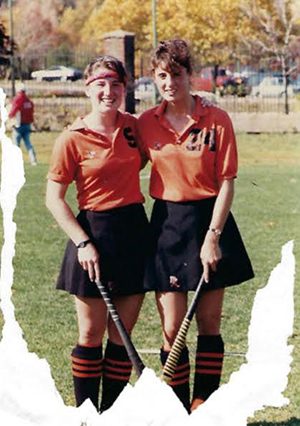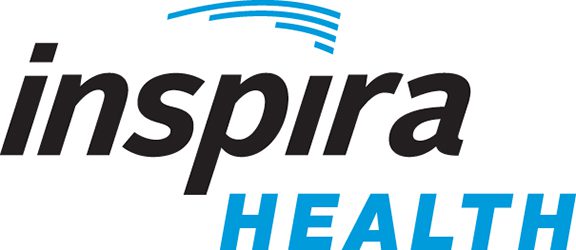Inspira Health: Keeping Young Athletes Healthy & Happy
Keeping young female athletes healthy & happy

As a field hockey and lacrosse player for Princeton University in the mid-80s, Jennifer Naticchia-Walls, MD, often thought about how sports would shape the next stages of her life. She has since forged a trailblazing career caring for future generations of female athletes.

Jennifer Naticchia-Walls, MD
Dr. Naticchia-Walls is one of the Delaware Valley’s first primary care physicians trained in sports medicine. She earned her medical degree from Jefferson Medical College, and finished a fellowship in sports medicine and faculty development at Thomas Jefferson University Hospital. She is now a physician with Inspira Medical Group, practicing in Haddon Twp., where she enjoys developing relationships with a varied group of patients. About 30 percent of them are active in sports, including female high school and college athletes. Dr. Naticchia-Walls’ background is especially helpful – she worked as a team physician with the Philadelphia Eagles, KiXX (former) professional soccer team and the Phantoms hockey team. Many of her patients seek her care because of her personal experience as an athlete and her professional experience in sports medicine.
“My patients appreciate that I understand what they’re saying about their workouts, the expectations of their coaches and the demands on them,” she says.

Jennifer Naticchia-Walls (left) and her sister Stephanie Naticchia-Angrick played together for one year at Princeton
Many of the athletes Dr. Naticchia-Walls sees have overuse injuries. She takes a conservative approach.
“My daughters quote me on this because I always say: ‘Let’s have you heal for 2 more days.’ My goal is to get them back, but if it happens too soon, they might get re-injured and miss the entire season. Selling them on the long game helps them put it in perspective.”
Dr. Naticchia-Walls also advises young athletes and their families when they are reviewing their options for a college sports career, as she understands the competitive and stressful nature of collegiate competition.
“Treating their sprained ankles and other medical issues is the easy part. There’s a lot of outside stressors that come into play,” she says. “I want them to feel like this is a safe place where they can come in and talk, and I can find resources for them.”
Outside of the office, sports are still very much a part of her life. Dr. Naticchia-Walls is a sideline doctor for Haddonfield Memorial High School football games, teaches through Rutgers University a S.A.F.E.T.Y course to coaches, and serves as a physician for 3 South Jersey school districts. On the volunteer front, she is the president of Haddonfield Youth Field Hockey, which she co-founded with other Haddonfield mothers. Although the couples’ children have since moved on from Haddonfield Youth Lacrosse Club – all 3 are in college – she and her husband Joe Walls still coach the Scoopers, the league’s kindergarten girls lacrosse team.
“We love coaching this age group because there’s no tryouts,” says Dr. Naticchia-Walls, who grew up in Haddonfield. “Everybody plays to have fun.”
The couple emphasized the fun of competitive sports and the value of exercise when they introduced athletics to their own children. Like Naticchia-Walls and many other family members, her 2 girls took to competitive NCAA Division 1 Lacrosse. Jenna, a sophomore, starts and plays for American University. Juliet is a freshman starter on the Villanova University Women’s Lacrosse team. Her son Joseph, a senior at Seton Hall, calls games for the D-1 school’s basketball teams (mens and womens along with other sports).
While she looks back on her playing days fondly, she says some of the issues facing female athletes today are similar to the challenges she faced some 30 years ago. Some are decidedly different. Inequality in the ’80s was more stark than it is today.
“When our team traveled for games, we’d stop at Wendy’s for a meal and I’d have to beg for an extra baked potato,” she recalls. “I remember trying to picture male athletes begging for a baked potato. The football team was eating in Princeton board rooms, probably surf and turf.”
In her playing days, she says, women’s athletic equipment sometimes played a factor in injuries because much of it was designed for men, just scaled down to size for women. While that’s changing in some sports, there’s still lots of room for improvement.
The pressure on female athletes to conform to a body type, particularly in individualized sports like cheer, skating and gymnastics, is an issue that was only starting to be recognized in the ’80s. “People believed the myth that you would be a better athlete if you didn’t have your period, and one way to do that is to not eat enough calories. We know that can lead to more stress fractures, overuse injuries and osteoporosis.”
In her practice today, she says, she talks to all of her patients about health and nutrition, stressing that “disordered eating” is a larger societal issue.
“I actually preface it by saying that probably every American has disordered eating,” she says. “We either undereat, overeat or don’t eat the right things. Most of us also don’t get enough exercise. I let them know that most of us can do better and we discuss what they can do.”
She emphasizes goal setting with her patients, often asking them to set goals in a contract – either verbal or written – to help them reach their goals, such as eating healthier choices or stopping smoking. Goal setting worked when she was trying to improve as an athlete, and it’s a proven way to motivate people to better health.
“We can’t do everything in one visit,” she says. “But we certainly can start with setting reasonable and healthy goals.”

Inspira Medical Group Primary Care
400 West Cuthbert Boulevard, Haddon Township
856-559-4277 | inspirahealthnetwork.org

